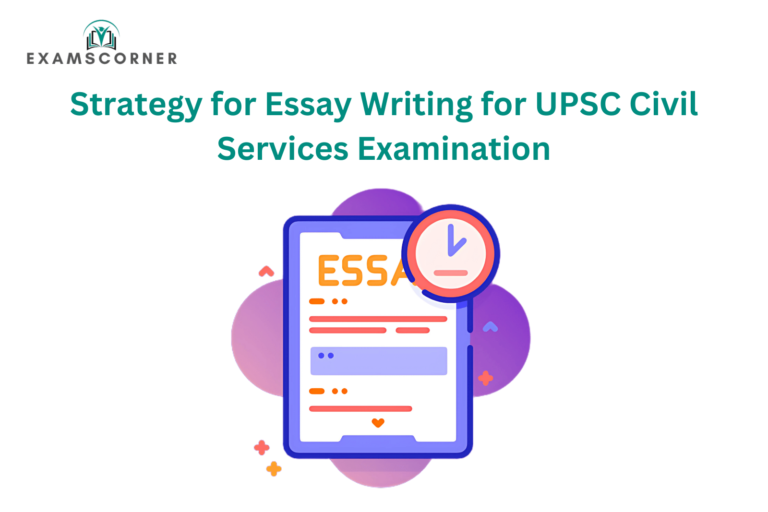Essay writing is a vital component of the UPSC Civil Services Examination (CSE), testing a candidate’s analytical abilities, coherence, and command over language. A well-structured essay not only reflects clarity of thought but also significantly enhances the overall score. This comprehensive guide covers the essential aspects of essay writing, from understanding its structure to implementing effective strategies.
Understanding Essay Writing
An essay is a concise piece of writing that explores a given topic in depth. As M.H. Abrams aptly described, “An essay is any short composition in prose that undertakes to discuss a matter, express a point of view, or persuade us to accept a thesis on any subject.”
In the context of the UPSC CSE, the focus is on formal essays. These essays are impersonal, authoritative, and adhere to a serious tone. They often incorporate factual elements such as statistics and quotes and avoid conversational or first-person references.
Types of Essays
Formal Essays: The focus of the UPSC CSE.
Informal Essays: Conversational and personal, generally not relevant for CSE.
Essay Writing in UPSC CSE
The UPSC essay paper consists of two essays, each within a 1000-1200 word limit, to be completed in three hours. Each essay carries 125 marks, contributing to a total of 250 marks. The paper is divided into:
Section A: Contains four topics; choose one.
Section B: Contains four topics; choose one.
The syllabus emphasizes “keeping thoughts closely to the subject,” “arranging ideas orderly,” and “effective and coherent expression.”
Analyzing Previous Year Questions
Analyzing past essay topics provides insights into recurring themes and emerging trends. For instance:
2016: “Innovation is the key determinant of economic growth and social welfare.”
Central Idea: Innovation’s impact on socio-economic dimensions.
2018: “Water disputes between states in federal India.”
Central Idea: Legal, political, and social aspects of water disputes.
Key Themes
Inclusive Growth
Ethics and Public Administration
Socio-political Challenges
Environmental Sustainability
Structuring an Essay
A well-structured essay is crucial for scoring high. The structure typically includes:
Introduction: Sets the tone and outlines the central theme.
Body Paragraphs:
Supportive Paragraphs: Provide positive facts and ideas.
Critical Paragraphs: Discuss challenges or counterpoints.
Narrative Paragraphs: Explain the topic in detail.
Conclusion: Summarizes the discussion and provides a forward-looking perspective.
Effective Introductions
Use quotes, anecdotes, or striking statistics.
Provide clarity and context to the topic.
Strong Conclusions
Restate key points succinctly.
Suggest actionable insights or a hopeful outlook.
Employ the ‘cyclic return’ method to connect back to the introduction.
Strategy for Essay Writing
1. Topic Selection
Choose topics you are confident about.
Opt for subjects where you can present a balanced perspective.
2. Brainstorming
Focus single-mindedly on the topic.
List all relevant points, categorized into social, political, economic, and environmental dimensions.
Use tools like mind maps and flowcharts.
3. Planning
Define the thesis statement (central idea).
Outline the essay’s structure before writing.
Allocate time for each section (introduction, body, conclusion).
4. PESTLE Analysis
Political: Government policies, constitutional dimensions.
Economic: Financial implications, resource management.
Sociological: Social equity, cultural impacts.
Technological: Role of innovation, advancements.
Legal: Judicial perspectives, legal frameworks.
Environmental: Sustainability, ecological considerations.
5. Language and Presentation
Write clearly and concisely.
Avoid jargon and overly complex sentences.
Ensure grammatical accuracy and neat handwriting.
Adding Elements to the Essay
Incorporate the following:
Facts and Statistics: E.g., census data, UN reports.
Quotations: Relevant quotes enhance the argument.
Examples: Real-life instances provide authenticity.
Opinions: Balanced views demonstrate analytical skills.
Experiences: Ethical personal anecdotes add value.
Avoid:
Absolutist positions.
Sweeping generalizations.
Contradicting the topic’s essence.
Time Management
Allocate 90 Minutes per Essay:
Planning: 30 minutes (brainstorming and outlining).
Writing: 45-50 minutes.
Revision: 10 minutes.
During Revision:
Check grammar and spelling.
Ensure logical flow and coherence.
Avoid introducing new ideas at this stage.
Recommended Resources
Books
151 Essays by S.C. Gupta.
Essays for Civil Services and Other Competitive Examinations by Pulkit Khare.
A Compendium of Essays by Unique Publishers.
Practice and Feedback
Practice Regularly:
Write essays on diverse topics.
Simulate exam conditions.
Seek Feedback:
Discuss essays with peers or mentors.
Incorporate constructive criticism.
Conclusion
Mastering essay writing for UPSC CSE demands consistent practice, structured preparation, and a strategic approach. By analyzing past trends, brainstorming effectively, and adhering to a coherent structure, candidates can craft compelling essays. Remember, a well-written essay is not just a reflection of knowledge but also of clarity, critical thinking, and balanced judgment — qualities indispensable for a future civil servant.



